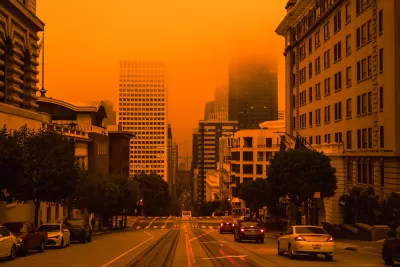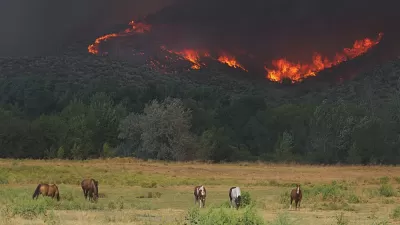Many companies set goals to achieve by 2020 and came up short, while the effects of climate change were more obvious than ever in the year that was 2020.

It's an undeniable fact of planning that 2020 lent itself to a catchy expression of forward-looking vision. It's provided a benchmark for plans of all kinds, including, naturally, climate adaptation and emissions reductions plans. But what seemed not too long ago like some distant goal post is now in the past. Instead of a vision of the vision, 2020 might come to symbolize a portent of a reality already arrived, but bound for much more worse.
Corporate Promises, Now in Hindsight
"Five years ago, a swath of U.S. companies set 2020 as a deadline for improvements in renewable energy, resource conservation and emissions reduction," according to an article written recently by Todd Gillespie, Hayley Warren, and Tom Randall.
"The initiative took on a clunky government name: the American Business Act on Climate Pledge. Chief executive officers such as Johnson & Johnson’s Alex Gorsky and Pacific Gas and Electric Co.’s Anthony Earley converged on the White House for a roundtable, and the president challenged them to set aggressive goals. More than half of the companies put forward quantifiable five-year targets, and some set multiple goals covering energy, emissions, and waste."
Gillespie, Warren, and Randall analyzed the climate commitments of 187 companies set for a 2020 due date to evaluate the success of these initiatives, finding about 138, so far, in line with their targets. The only caveat is that the companies that have achieved their goals set modest goals to begin with.
2020 Visions
While 2020 was always bound to be a landmark year for companies undertaking voluntary emissions reductions, the proof that those actions weren't enough showed up in a year full of wildfires, droughts, and extreme heat—setting aside the possibility that climate change had something to do with the introduction and spread of the novel coronavirus (a threat long predicted as a consequence of climate change).
Starting with drought: According to an article by Luke Runyon, drought conditions on the Colorado River have reached an unprecedented tipping point. "Dry conditions are the worst they’ve been in almost 20 years across the Colorado River watershed, which acts as the drinking and irrigation water supply for 40 million people in the American Southwest," writes Runyon. "As the latest round of federal forecasts for the river’s flow shows, it’s plausible, maybe even likely, that the situation could get much worse this year." With 84 percent of the Upper Basin in extreme to exceptional drought, that part of the West is experiencing the driest year on record. The situation is even drier on the Lower Basin, where 93 percent of the of the watershed is in those same categories.
In April 2020, researchers determined that the Western United States is in a megadrought unmatched in the past 1,200 years.
Then there were the fires. In an article by Judy Fahys that ties together all the issues—fires, drought, extreme heat—the fact that Colorado and California endured unprecedented wildfire seasons stands out. But don't forget Arizona, which saw a record number of nights where the temperature never dipped below 90 degrees Fahrenheit, 29 in all, almost doubling the previous record of 15. "When final data for last year rolled in, the National Oceanographic and Atmospheric Administration showed that Arizona had endured its second hottest year on record, with an average temperature of 62.6 degrees Fahrenheit," writes Fahys.
2020 also set a record for billion-dollar disasters. According to data from the National Oceanic and Atmospheric Administration, a total of 22 disasters reached the $1 billion total, incurring $95 billion in damage all together.
There are signs that some have had enough with the world changed by greenhouse gas emissions. An article Debra Kamin reports on the increasing number of Californians deciding not to rebuild after another year held siege by the fires and smoke that have become commonplace in recent years. Californians aren't the only Americans displaced by climate change. An estimated 1.2 million Americans are already on the run from climate change. Yes, Americans are climate refugees too.
Moving to Texas, however, won't solve climate change—it could only be a move from the proverbial frying pan into the proverbial fire. With the new administration in the White House committed to climate action, 2021 might start setting new kinds of standards when it comes to climate change, but as 2020 showed, it's already too late for some of how the world used to be.

Planetizen Federal Action Tracker
A weekly monitor of how Trump’s orders and actions are impacting planners and planning in America.

Maui's Vacation Rental Debate Turns Ugly
Verbal attacks, misinformation campaigns and fistfights plague a high-stakes debate to convert thousands of vacation rentals into long-term housing.

Restaurant Patios Were a Pandemic Win — Why Were They so Hard to Keep?
Social distancing requirements and changes in travel patterns prompted cities to pilot new uses for street and sidewalk space. Then it got complicated.

In California Battle of Housing vs. Environment, Housing Just Won
A new state law significantly limits the power of CEQA, an environmental review law that served as a powerful tool for blocking new development.

Boulder Eliminates Parking Minimums Citywide
Officials estimate the cost of building a single underground parking space at up to $100,000.

Orange County, Florida Adopts Largest US “Sprawl Repair” Code
The ‘Orange Code’ seeks to rectify decades of sprawl-inducing, car-oriented development.
Urban Design for Planners 1: Software Tools
This six-course series explores essential urban design concepts using open source software and equips planners with the tools they need to participate fully in the urban design process.
Planning for Universal Design
Learn the tools for implementing Universal Design in planning regulations.
Heyer Gruel & Associates PA
JM Goldson LLC
Custer County Colorado
City of Camden Redevelopment Agency
City of Astoria
Transportation Research & Education Center (TREC) at Portland State University
Jefferson Parish Government
Camden Redevelopment Agency
City of Claremont






























